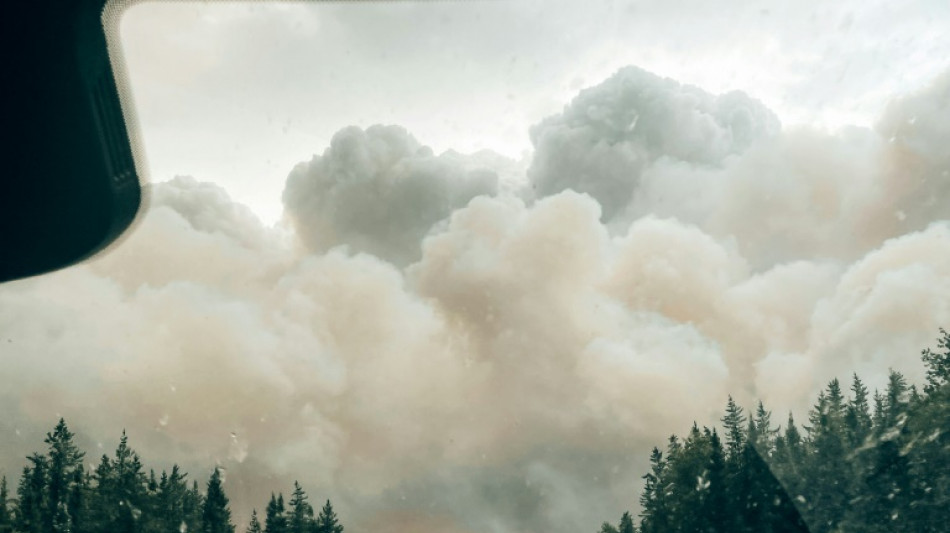
-
 Arteta urges Arsenal to break New Year Premier League curse
Arteta urges Arsenal to break New Year Premier League curse
-
Norway closes in on objective of 100% electric car sales

-
 Dani Alves invests in Portuguese third division club
Dani Alves invests in Portuguese third division club
-
Trump says US will 'come to their rescue' if Iran kills protesters

-
 Orsted files lawsuit against US suspension of wind turbine leases
Orsted files lawsuit against US suspension of wind turbine leases
-
South Koreans now free to read North's newspaper, once banned as seditious

-
 Stocks make bright start to 2026
Stocks make bright start to 2026
-
Bashir, Potts in England squad for final Ashes Test

-
 Argentina topple Spain for winning United Cup start
Argentina topple Spain for winning United Cup start
-
Champions Narvaez and Ruegg to defend Tour Down Under titles

-
 'Are they OK?': desperate search for the missing after Swiss fire
'Are they OK?': desperate search for the missing after Swiss fire
-
'Are they OK?': desparate search for the missing after Swiss fire

-
 Asia stocks make bright start to 2026
Asia stocks make bright start to 2026
-
Miami and Houston stretch NBA win streaks to four games

-
 Swiss investigators rush to identify victims of New Year's fire
Swiss investigators rush to identify victims of New Year's fire
-
Bicycle kick king El Kaabi is new AFCON hero for hosts Morocco

-
 What to look out for in the Premier League transfer window
What to look out for in the Premier League transfer window
-
Maduro elusive on US attack, open to dialogue

-
 Venus Williams gets Australian Open wildcard aged 45
Venus Williams gets Australian Open wildcard aged 45
-
Trump blames bruised hand on aspirin, denies falling asleep

-
 Dress for success: Mexican president's ideological attire
Dress for success: Mexican president's ideological attire
-
Best of frenemies: Saudi, UAE rivalry bursts into view

-
 'Positive signs' on hospitalised Australian cricket great Martyn
'Positive signs' on hospitalised Australian cricket great Martyn
-
North Korean leader's daughter in first visit to symbolic mausoleum

-
 The Crans-Montana fire: a Swiss tragedy that raises questions
The Crans-Montana fire: a Swiss tragedy that raises questions
-
Around 40 killed as fire ravages Swiss ski resort New Year party

-
 Australia's Khawaja to retire after Ashes finale, slams 'racial stereotyping'
Australia's Khawaja to retire after Ashes finale, slams 'racial stereotyping'
-
Golden Minerals Company Substantially Reduces Liabilities in Mexico

-
 Tocvan Provides 2025 Year in Review
Tocvan Provides 2025 Year in Review
-
WeTrade Supports UNICEF to Improve Children's Wellbeing in Indonesia

-
 Evotec Appoints Dr. Sarah Fakih as EVP, Head of Global Communications and Investor Relations
Evotec Appoints Dr. Sarah Fakih as EVP, Head of Global Communications and Investor Relations
-
Frank accepts 'boring' jibes from Spurs fans after Brentford stalemate

-
 Guardiola vexed by Man City's sloppy finishing in Sunderland draw
Guardiola vexed by Man City's sloppy finishing in Sunderland draw
-
Tears and stunned silence at vigil for Swiss fire victims

-
 Wembanyama to miss Spurs' NBA game Friday at Indiana: reports
Wembanyama to miss Spurs' NBA game Friday at Indiana: reports
-
Man City charge stalls at Sunderland, Liverpool held by Leeds

-
 Man City's title bid dented by Sunderland stalemate
Man City's title bid dented by Sunderland stalemate
-
Australia's Khawaja announces retirement from international cricket

-
 Niners seek win for home-field playoff edge into Super Bowl
Niners seek win for home-field playoff edge into Super Bowl
-
New York mayor Mamdani pledges left-wing success after taking office

-
 Slot frustrated by blunt Liverpool in Leeds stalemate
Slot frustrated by blunt Liverpool in Leeds stalemate
-
Toothless Liverpool held by Leeds

-
 Dozens killed as fire ravages Swiss ski resort New Year party
Dozens killed as fire ravages Swiss ski resort New Year party
-
K-pop stars BTS to release album in March ahead of world tour

-
 Fresh clashes kill six in Iran cost-of-living protests
Fresh clashes kill six in Iran cost-of-living protests
-
Nigeria kicks off new tax regime vowing relief for low earners

-
 Dozens killed in fire at Swiss ski resort New Year party
Dozens killed in fire at Swiss ski resort New Year party
-
Leftist Mamdani begins first day as New York mayor

-
 Dozens believed killed in fire at Swiss ski resort New Year party
Dozens believed killed in fire at Swiss ski resort New Year party
-
Brazil Supreme Court rejects Bolsonaro request for house arrest on health concerns

| SCS | 0.12% | 16.14 | $ | |
| NGG | -0.54% | 77.35 | $ | |
| GSK | -0.53% | 49.04 | $ | |
| RIO | -0.61% | 80.03 | $ | |
| CMSD | 0.09% | 23.15 | $ | |
| CMSC | -0.15% | 22.65 | $ | |
| BP | -0.06% | 34.73 | $ | |
| BCE | 1.05% | 23.82 | $ | |
| BCC | -0.26% | 73.6 | $ | |
| AZN | -0.63% | 91.93 | $ | |
| BTI | 0.12% | 56.62 | $ | |
| RBGPF | -0.37% | 80.75 | $ | |
| RYCEF | 0.13% | 15.51 | $ | |
| JRI | 0.22% | 13.61 | $ | |
| RELX | -1.71% | 40.42 | $ | |
| VOD | -0.15% | 13.21 | $ |

Extreme fire: 'unprecedented risk' poorly understood
In an era of town-torching megablazes spewing smoke plumes visible from space, scientists say there is still a lot they don't know about the effects of extreme fire on people, nature and the climate.
Athens, Maui and now Los Angeles are among major cities across the globe to suffer catastrophic fires, while blazes in Canada's forests have broken records in recent years.
Changes in fire behaviour wrought by climate change and other human influences represent "an unprecedented risk that is still very poorly understood", an international group of scientists warned last year in a report for the European Space Agency and FutureEarth.
Human activities, they said, "have become an inexhaustible source of wildfires".
Scientists tallying effects on people and planet are flying planes through smoke belched by raging infernos, scouring satellite images and scooping samples from soils and waterways.
Sometimes the flames come to them.
In late December 2021, Christine Wiedinmyer, a University of Colorado professor specialising in air pollution and fire emissions, was working at home when emergency services rang telling her to leave.
What started as two small fires on the edges of Boulder had become a monster wall of flame in under an hour, whipped by hurricane-force winds over snow-free grassland.
Wiedinmyer found it hard to believe there was a serious risk on that winter's day but the pasture around town was tinder-dry from months of drought and the fire was already bearing down with the force of a blowtorch.
"You could see the smoke plume right behind my house," she told AFP.
Wiedinmyer joined tens of thousands of locals inching out of town in heavy traffic engulfed in churning smoke and flying embers.
The next day it began to snow.
Wiedinmyer returned to a soot-smeared home and questions from neighbours: were surviving structures contaminated? If so, how could they be safely cleaned?
- Forecast fireweather-
Fire has played a role in nature for millions of years -- some species thrive on it -- and human history is entwined with the ability to tame it.
But destructive and intense megafires are now increasing, as humans shape a new combustible era that prominent fire historian Stephen Pyne has called the "Pyrocene".
"Fire has been a companion and now it's becoming our worst enemy," he said.
Tinderbox conditions -- a combination of heat, drought and strong winds often called "fire weather" -- are made more common by climate change.
But it is not the only factor.
Lightning, power lines and arson have provided a spark, while damage risk grows as homes and businesses encroach into fire-prone areas.
In some forest regions, decades of overzealous fire prevention have allowed a build-up of flammable vegetation, leading to calls to relearn indigenous fire management techniques.
Intense rainfall -- on the rise as warming alters the water cycle -- may make things worse, spurring plants to grow fast and then dry into kindling.
Research in 2021 linked melting Arctic sea ice to larger wildfires in the western United States.
With warming of two degrees Celsius -- just above the upper limit of the Paris climate deal -- and expected changes in rainfall, wildfires are projected to burn 35 percent more land, the UN's climate expert panel has said.
There are limitations to humans' ability to adapt, said Kirsten Thonicke, of Potsdam Institute for Climate Impact Research, as smoke carries pollution huge distances.
"You cannot evacuate Sydney or San Francisco, you can only try to protect people there," she said, stressing the need to cut planet-heating emissions.
- 'Regime change' -
Some fires change the weather.
Firestorm clouds can whip up winds and shoot off lightning bolts, while fire tornados are towering funnels of flame thrashing across the landscape.
And extreme blazes are affecting the environment and atmosphere.
The 2023 Canadian wildfires released more carbon in five months than Russia emitted from fossil fuels in a year, NASA scientists found.
Most of that CO2 is reabsorbed as trees regrow but there are concerns that more frequent fires could reduce forests' capacity to take up carbon.
In 2023, researchers found that a chemical reaction from smoke released by massive wildfires in Australia made 2020's ozone hole 10 percent wider.
Another study found ash from the same fires landed on the ocean, triggering plankton blooms that soaked up the extra CO2, at least temporarily.
Joan Llort, of the Barcelona Supercomputing Center, who led that research, said ash from huge fires was part of "regime change" in the Arctic, coating ice and causing it to melt faster.
- Close to home -
What preoccupied Christine Wiedinmyer after Boulder's Marshall Fire was residue in homes.
"There's a lot of nasty stuff that gets put out there when you burn a house or a car, or electronics," she said. "Where does it go?"
Wiedinmyer and colleagues took samples from the air, soils and houses and measured the effects of cleaning.
Early research found harmful smoke compounds were sucked into walls only to leach out days or even months later.
One finding of potential use to residents in LA, where thousands of homes have burned, was that wiping down walls and floors with soap and water reduced contamination.
"That is a really useful piece of information to help guide future people who are exposed," Wiedinmyer said.
A.Rodriguezv--AMWN